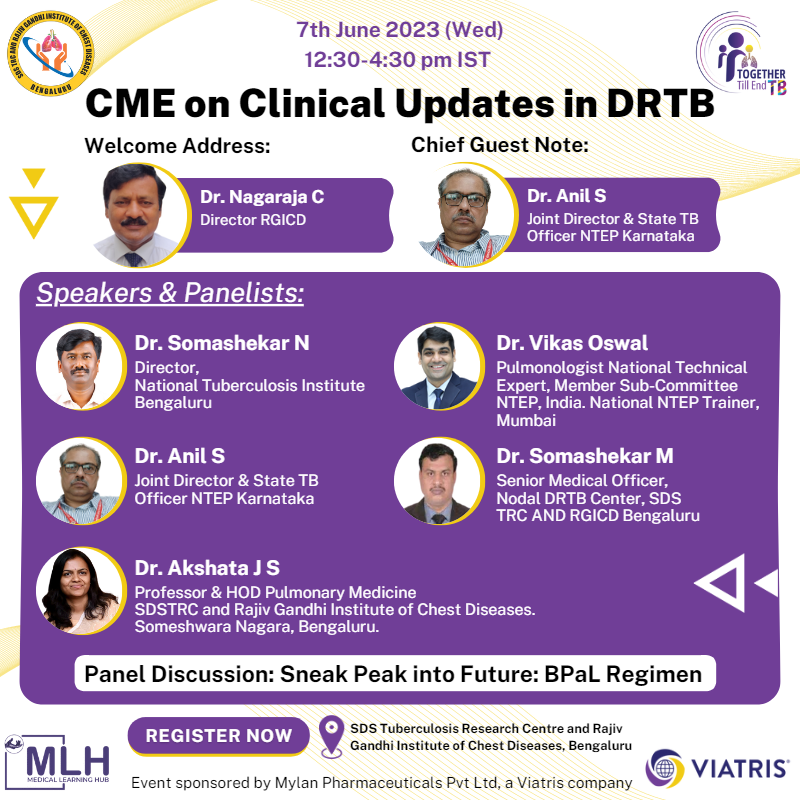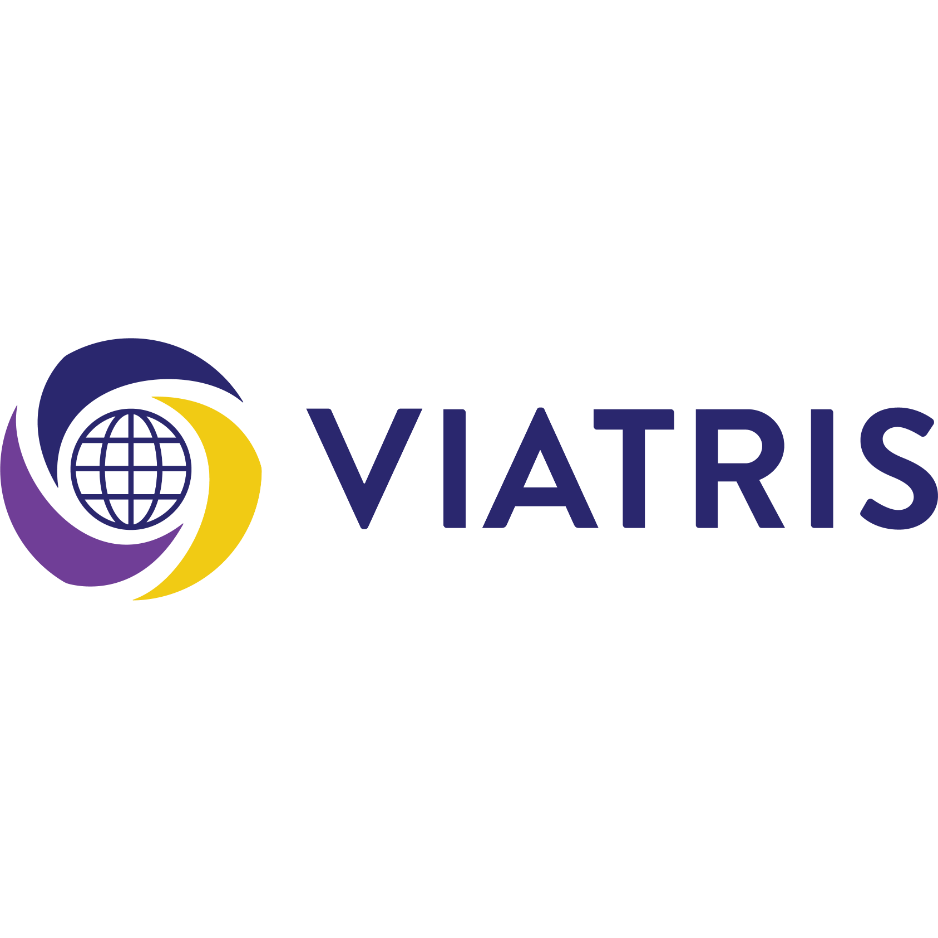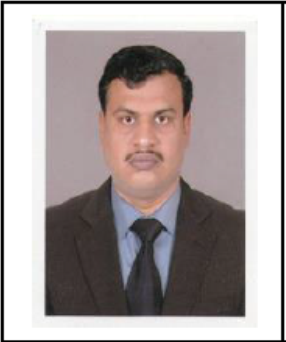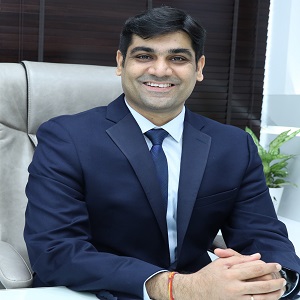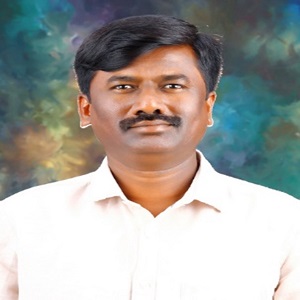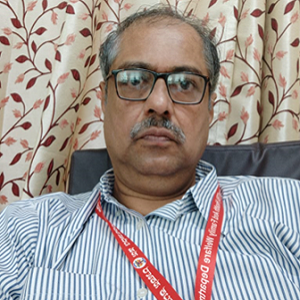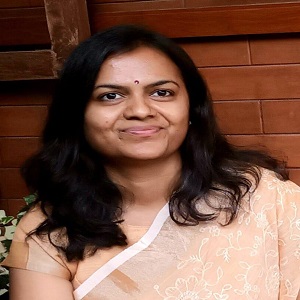Module 1: Welcome address: Dr. Nagaraja C, Director, RGICD welcomed all the participants and speakers. He also briefly introduced the speakers.He enlightened the needs of the DRTB issue in India. The first poll was raised.
Module 2: Inauguration and address by STO Karnataka : Dr Anil S, Joint Director & State TB officer NTEP Karnataka thanked MLH for organizing the CME. Because of newer medicines and technologies ending TB is possible. He also shared an example of a study conducted on a list of therapeutics of DRTB.
Module 3: Overview of current Guidelines for Diagnosis & Management of DR-TB : Dr. Somasekhar N, Director NTI, Bangalore shared his experience about the current guidelines for diagnosis and management of DRTB. He thanked MLH and organizers.
- Latest statistics on TB incidents and TB mortality and MDR TB globally and nationally.
- Programmatic challenges in treating DRTB.
- The classification of DRTB patterns which includes MRTB, HrTB, PDRTB, RRTB, MDRTB, PreXDRTB and XDRTB.
- Detection of drug resistant and drug susceptibility
- Different laboratory diagnostic tools for microbiological confirmation of TB.
- Method of DRT and DST detection.
- The clinical interpretation of different drug resistance as per the test results.
- Integrated DRTB diagnosis and treatment algorithm
- Grouping of Anti TB drugs and other considerations. Drugs available for treatment. Drugs which were not using because of the proven side effects.
- Importance of pre-treatment counseling to the patient.
- Treatment algorithm of MDR/RRTB.
- Isoniazid (H) mono/poly regimen treatment algorithm.
- Inclusion and exclusion criteria of regimen and duration of drugs.
- Follow up and monitoring for H mono/poly DRTB regimen.Possible adverse drug re
- action while treating the patient.
- Shorter oral Bedaquiline containing regimen. It includes pre treatment evaluation, regimen and duration, dosage, followup and monitoring, adverse drug reaction etc.
- Approved Inclusion and exclusion criteria for Bedaquiline usage.
- List of drugs that can be used safely and to be avoided with Bedaquiline.
- Evaluation of psychiatric illness while treating patients.
- List of possible adverse drug events due to drugs in shorter oral Bedaquiline.
- Pre treatment evaluation of M/XDR TB patients.
- Dosages of M/XDR TB drugs for adults in longer oral M/XDR TB regimen.
- Sequence of using replacement drugs to modify longer oral M/XDR TB regimen.
- Followup and monitoring during pregnancy and lactating women for shorter/longer oral MDR TB regimen.
- Dose adjustment in different health conditions.
Module 4: Treatment/Management Updates on DRTB (Case based discussion), covering special situations (CNS TB, Paeds TB): Dr. Vikas Oswal, Pulmonologist, also a pioneer in “private-public-NGO” partnership shared his expertise on the treatment and management of DRTB which also covered the special situation like CNS TB, Paeds TB.
- Isoniazid (H) mono/poly regimen treatment algorithm
- Based on the drug resistance, sequence of using replacement drugs.
- Few cases were presented. The investigations, diagnosis and treatment management were explained.
- Treatment algorithm of MDR/RR TB.
- Grouping of anti TB drugs and other considerations.
Module 5: Management of DREPTB :Dr Anil S, Joint Director & State TB officer NTEP Karnataka talked about the current concepts in the management of Extra pulmonary TB.
- The current situation of DRTB in Karnataka.
- Definition and incidence of DREPTB.
- Symptoms of EPTB and collection of specimens.
- Appropriate testing for extra pulmonary TB.
- Clinical diagnosis of EPTB.
- Response to treatment in EPTB.
- Standardized regimens for treating EPTB.
- Severe form of EPTB and TB Meningitis in all oral longer regimen.
- TB with HIV infection and other comorbid conditions.
Module 6: Management of ADR TB: Dr. Somasekhar M, Senior Medical Officer, Nodal DRTBCenter, SDS TRC AND RGICD Bangalore presented the clinical management of ADR’s in DRTB.
- Importance of counseling to the patient to start a treatment. Counseling also includes diet counseling, nutrition counseling, drug adherence counseling etc..
- Management of adverse drug reactions. Most adverse effects of several second line drugs are dose dependent.
- Psychological support is an important component of management of adverse effects.
- Suggested management strategies to treat adverse effects like nausea, vomiting, abdominal pain, urticaria, rashes, anaphylaxis, diarrhoea, hepatitis, psychotic disorders etc.
Module 7: Panel discussion: Sneak Peak into Future: BPaL Regimen Panel discussion on BPal regimen conducted by Dr. Nagaraja C, Dr. Anil S, Dr. Somasekhar N, Dr. Vikas Oswal, Dr. Somasekhar M and Dr. Akshata JS. The experts have shared their clinical knowledge by discussing about the BPal regimen, DRTB diagnosis, challenges in screening for TB, contribution from private sector etc.
- What are the key challenges towards screening diagnosis of TB patients and how to improve the access?
- Importance of airborne infection control in healthcare settings.
- Expert views around the private sector participation in terms of providing DRTB diagnosis and treatment.
- How to deal with discordance between gene xeprt and LPN and DST?
- Expert opinion on strengthening DRTB center for decentralization for DRTB management.
- Expert’s experience on existing shorter regimens of DRTB management.
- How to strengthen UDST - universal drug susceptibility testing?
- How important is the management in paediatric DRTB patient?
- What are all the activities required for roll out of Bpal regimen or the adoption of BPal regimen?
- Few questions were also asked by the attendees which were all answered by the experts.
Module 8: Vote of thanks: Mr. Vivek from Viatris delivered vote of thanks to all the speakers, panelists, attendees and MLH team.
The second poll was raised.
We thank Mylan Pharmaceuticals Private Limited, a Viatris Company for supporting us in the event.
Welcome Address by: Dr Nagaraja C Director RGICD (10 Min)
Inauguration & address by STO Karnataka: Dr Anil S (15 Min)
Speaker session 1: Overview of current Guidelines for Diagnosis & Management of DR-TB: Dr Somasekhar N NTI (45 Min)
Speaker session 2: Treatment/Management Updates on DRTB (Case based discussion), covering special situations (CNS TB, Paeds TB): Dr Vikas Oswal (60 Min)
Speaker session 3: Management of DREPTB: Dr Anil S (30 Min)
Speaker session 4: Management of ADR TB: Dr Somasekhar M (30 min)
Panel discussion: Sneak Peak into Future: BPaL Regimen (45 min)
Panelists:
- Dr Anil S
- Dr Somasekhar N
- Dr Vikas Oswal
- Dr Somasekhar M
- Dr Akshata JS
Vote of thanks (10 Min)


